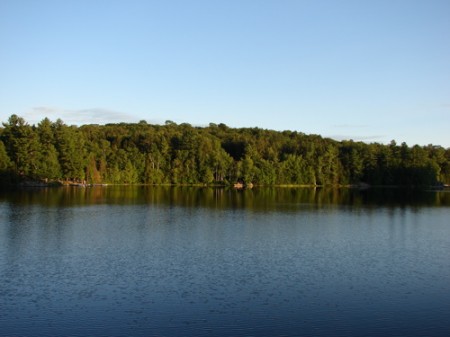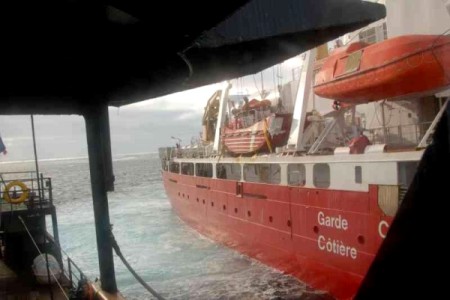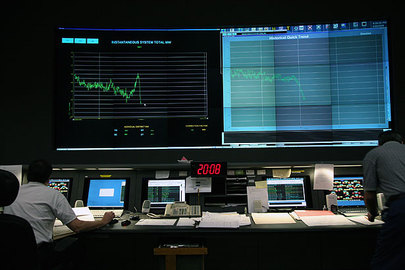
|
||
|
|
||
|
04 28
Canada’s Fragile Fresh Water System
 Water seems abundant in Canada, but is it really?
Water seems abundant in Canada, but is it really?
In the land of glacial waters and spring thaws the last thing most Canadians think about is where their next drink of clean water is coming from. Big mistake. Canada does not have a limitless supply of fresh water. Only a small fraction of the water we see when visiting the Great lakes, for example, is "new" and if we consume it or pollute it or otherwise make it unusable it will not be readily replaced. In today's Globe and Mail John Austin makes his case to Canadians that we have to protect and conserve this finite resource:
04 23
Boeing And Airbus Meet To Reduce Carbon Footprint Of Air Travel
Aviation industry competitors AIrbus And Boeing signed an agreement Tuesday that will let them work together to reduce air travel’s carbon footprint. According to AFP:
Unlike Virgin Airline’s recent use of biofuels to reduce CO2 emissions, this agreement is premised on improving aircraft routing efficiencies which will reduce the amount of time an aircraft is airborne consuming fuel. Fuel savings generated from this tactic could top 10% in Europe and more in the United States where air traffic is heavier.
04 22
Silver Donald Cameron On Paul Watson
SIlver Donald Cameron introduces his view of the great Sea Shepherd debate:
If you thought all Easterners supported Minister Hearn’s reckless seizure of a foreign vessel in International waters, well, you haven’t read Cameron’s blog, Silver Donald on Sunday. Is Paul Watson really gutless?
To read more of Cameron’s critique of Canada’s sealing policy, go to today’s Chronicle Herald. Meanwhile, in Watson’s personal blog on the Sea Shepherd site, the altercation continues:
04 14
Sea Shepherd Stormed—But Fighting Back In Press
 Canadian Fisheries has once again proven that it thinks bad politics beats good policy. Last weekend’s seizure of the Farley Mowat—a Sea Shepherd Foundation protest vessel—proves the point. After an abysmal week for the Canadian Government agency where four fisherman drowned as a result of a towing accident involving a Canadian icebreaker, Fisheries Minister Loyola Hearn decided to deflect the generation-old criticism of Canada’s sealing industry by arresting environmentalists. Leader of the Sea Shepherd organization Paul Watson made it easy for Hearn to take this step when he stated, “The Sea Shepherd Conservation Society recognizes that the deaths of four sealers is a tragedy but Sea Shepherd also recognizes that the slaughter of hundreds of thousands of seal pups is an even greater tragedy.” According to the CBC, Watson also described sealers as “sadistic baby killers” and “vicious killers who are now pleading for sympathy because some of their own died while engaged in a viciously brutal activity.” With eastern Canada enraged over Watson’s comments, Minister Hearn saw an opportunity to act and he did. He ordered the Mowat seized in international waters. Of course, this was Watson’s purpose all along: provoke a disproportionate government response to get headlines and reach an international audience. Read this quote from the Sea Shepherd’s web site:
Given the provocation, it is hard for Canadians to support Watson’s efforts to ban sealing. That’s why Green Party leader Elizabeth May decided that it was time to distance herself from the group. She resigned from her role as an advisor to the Sea Shepherd society.
Canada’s bad policy on sealing makes Watson’s job easier. The story is already in the world’s news cycle, and Canada’s image abroad is eroded first and foremost by the primitive spring blood ritual, and then by the making of laws meant to prevent observers from covering the slaughter. When a Canadian icebreaker rams an environmental protest vessel in international waters it is easy to guess how the story will be played by the world’s press. From the Australian News site:
From the Globe and Mail:
04 11
Failing Economics: A Story From www.readingtoronto.com
By Peter Fruchter @ Reading Toronto
 Hey -- what’s with the partial nudity? That’s just how Robert Nadeau regards economists. Because, according to his recent article in Scientific American, economists are scientifically ignorant. That’s why, on his view, Unscientific assumptions in economic theory are undermining efforts to solve environmental problems.Essentially, Nadeau’s argument isn’t that economic theories are inconsistent. Only absurdly incomplete. As if mainstream economists were describing nothing but straight narrow portions of spectacularly long winding roads. Thus, particularly when it comes to ecological impacting, economists mislead us. Their theories can’t lead us anywhere we need to go. Economic theories are misleading rather than explanatory due to how absurdly incomplete they are. Nadeau is calling for economic upgrades: Because neoclassical economics does not even acknowledge the costs of environmental problems and the limits to economic growth, it constitutes one of the greatest barriers to combating climate change and other threats to the planet. It is imperative that economists devise new theories that will take all the realities of our global system into account.Some economists might not take Nadeau’s threat to tinker economics lying down, though. “Bender”, for instance, commented that, In an article purportedly discussing economic analysis and environmental policy neither externality nor externalities ever appeared! I don’t know which is more depressing, that someone could be stupid and ignorant enough to produce this tripe or that the Scientific American has sunk so low as to publish it.How pedantic. That's exactly what Nadeau's talking about -- how overwhelming economic externalities like ecology are getting. But Nadeau not utilising the specific terms “Bender” recognizes resulted in “Bender” utterly missing Nadeau’s point. Standard economic theories mislead us precisely because environmental crisis constitutes such overwhelming externality. Nadeau’s right, of course. We are rushing full steam and toxic waste to being overwhelmed. Not just economically. But should economists seek to internalize theoretically and factually overwhelming externalities like environmental crisis? No. By no means. Absolutely not. There is no economic solution to our problems. Rather, let’s better appreciate how limited and incomplete economic theories are -– and let’s start looking way past economics for what it means to be more natural. What it means to be at all natural. Can we do that? Toronto living is just about the most economically affluent anywhere –- ever. We expect some economic turbulence ahead. Will we be willing to look past it –- for what it means to be more natural? Or do we remain forever fixated on economic maximizing -- regardless how affluent we get? Regardless the cost to everything natural so precariously remaining? [Peter Fruchter teaches in the Division of Humanities at York University.] Screenshot from here.
04 09
Gore: Crisis of Citizenship Impedes Addressing Environmental Crises
By Patriot Daily News Clearinghouse (at http://www.dailykos.com — borrowed without permission but with good intentions)
Last month Al Gore discussed how our democracy crisis is impeding our efforts to address the climate crisis. As Gandhi said, "We must become the change we want to see" in the world. Gore stated that we can not solve the climate crisis until we solve the crisis of citizenship and democracy. The outcome we desire for global warming or any environmental issue is not going to be achieved by our beliefs unless it is accompanied by new behavior of citizen involvement at both the personal and political levels. Behavioral changes are good, like conservation, but Gore stated that it is more important to change the laws. Changing laws requires acknowledging an urgency of the environmental crises we face. We have not yet acknowledged that urgency with global warming. 68% of Americans agree that global warming is caused by human activity and 69% believe the earth is heating up in a significant way. However, we are missing that sense of urgency, which is reflected in the fact that global warming and environmental issues are ranked at the bottom of issues of importance. What we can do to move toward establishing that sense of urgency needed to trigger active citizenship which then triggers solving environmental issues is to understand the facts and analyze the issues. Once we agree upon the facts and analysis, then we must take action to change our political culture. This happened in Australia, which faced such a devastating drought that the people unified in a campaign to "lift the sense of urgency for the people about global warming and drought." The campaign included participation by newspaper, TV, radio and the internet, and it created the sense of urgency that led to a changed government with a new prime minister whose first action was to change position on global warming by ratifying Kyoto. Gore warned that we can not wait until we face water shortages like the drought in Australia.
The extreme event apparently must be either an event with national impact or a regional crisis for which people nationwide can identify. I say this because Katrina did not trigger any campaign or movement to change laws to remedy the natural or man-made disasters in NOLA. Years of massive environmental disasters in Appalachia have similarly been met with silence. Gore is right that we can not wait for a drought like Australia. However, something is preventing public recognition of a sense of urgency with environmental issues. One obstacle is that many environmental issues are usually implicitly (if not also expressly) mocked as simply a liberal "tree hugger" issue that really is not important, but simply a case of tree hugger activists who have too much spare time on their hands. We can see this to some extent with the global warming deniers who have been effective in delaying action by decreasing political (...read more...)
03 30
Earth Hour: Hit or Miss?
The ratings are in—Toronto’s energy use dropped about 9% over Saturday evening’s normal electrical consumption. Not bad, but when you think about it, not that great either. You have to wonder where most of that energy drop came from. My bet is that it was from the big commercial users—office towers, etc. Consumers? Well, the drop was probably 2 to 3%. After all, there was a hockey game on, right?
Maybe we were inspired by our leader, Stephen Harper. Turns out that Mr. Harper kept his lights on both at home and in the office. The Toronto Star writes:
Actions, as it is said, speak far louder than words. To his credit, Environment Minister John Baird turned off his lights, as did Stephane Dion, leader of the Liberal Party.
|

Contribute to the MESH Cities intelligent city database. Click here.
Read what people are saying about the environmental issues that impact us all
News about wind energy
News about green investing
Blog posts about electric cars
|
The best green news sources on the Net
Treehugger
Eco Worrier
Inhabitat
Lime
World Changing
|



